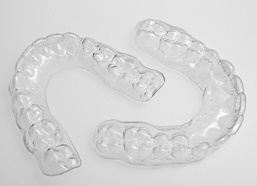Tooth abrasion is defined as the pathologic wearing away of a substance or structure (such as a tooth), through some unusual or abnormal mechanical process. In dentistry, this takes the form of enamel – the outer covering of the tooth – wearing away from the surface of the tooth due to rubbing, scratching or scraping.
Abrasion Can Result From Many Different Issues

Retainers can cause tooth abrasion
Brushing too hard can frequently wear away the surface of the enamel, as can using toothpicks. If you wear retainers or dentures that you remove from your mouth, the repeated putting on and pulling off may also cause damage to the enamel.
Signs of Tooth Abrasion
Signs of tooth abrasion include sensitivity to heat and cold, usually toward the top of the tooth, where it meets the gum line. Over time, significant abrasion may result in a small “ledge” between the tooth and the gum. In fact, you may first notice the problem by sight instead of feeling, when your teeth start to display a V-shaped notch between tooth and gum.
You may also notice a shock-like sensation when you touch the abraded area, and brushing may become more painful. Gums may also become irritated, red or swollen. If the abrasion is bad enough to expose the dentin, a protective layer underneath the enamel and protecting the tooth, you may experience greater pain.
Minimize Your Chances of Abrading Teeth
Males are more likely to experience abrasion than females, and the chances of it occurring increase as you get older. To minimize your chances of abrading teeth, or to allow them to heal once you’ve noticed abrasion, try the following tips:
- Brush only with soft-bristled toothbrushes
- Brush lightly to avoid aggravating teeth
- Use dental floss and toothpicks only according to directions
Other Causes of Damaged Enamel
Note the abrasion is not the only process that can damage enamel. So can erosion, which is when acids or other chemicals eat away at the surface of the tooth (which occurs with acid reflux and bulimia, for example, and from long exposure to the chlorine in swimming pools). This is not the same as abrasion, however, and healing the tooth will consequently require different actions.
If you think your teeth might be suffering from abrasion, ask your dentist to take a look. It is possible that simply pinpointing the cause and changing the behavior is enough to stop the problem. If that doesn’t work, your dentist may recommend further treatment to fix the tooth or teeth. Call Gulf Coast Houston Endodontics for specialized treatment.
